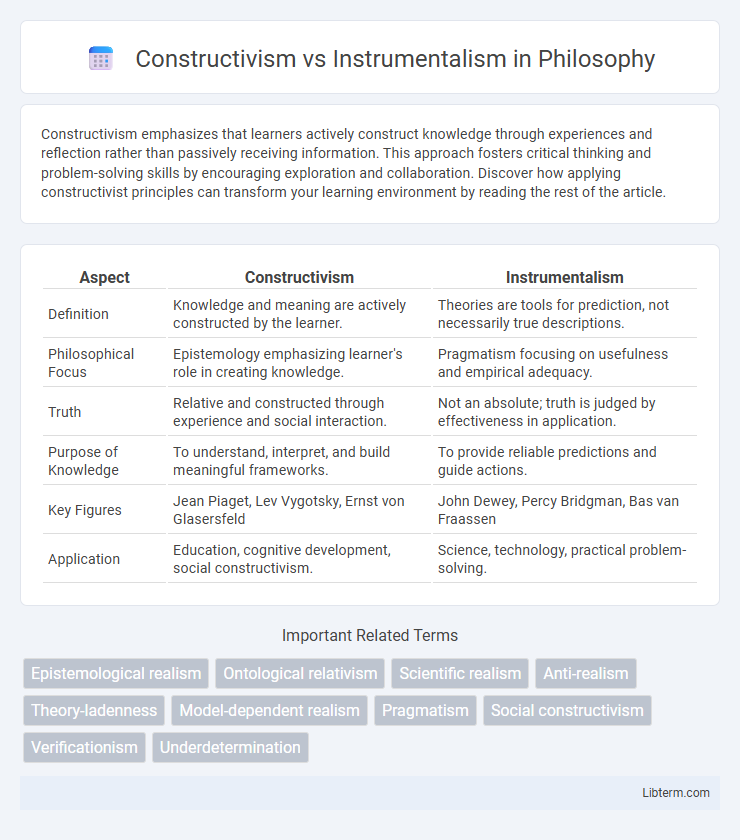Constructivism emphasizes that learners actively construct knowledge through experiences and reflection rather than passively receiving information. This approach fosters critical thinking and problem-solving skills by encouraging exploration and collaboration. Discover how applying constructivist principles can transform your learning environment by reading the rest of the article.
Table of Comparison
| Aspect | Constructivism | Instrumentalism |
|---|---|---|
| Definition | Knowledge and meaning are actively constructed by the learner. | Theories are tools for prediction, not necessarily true descriptions. |
| Philosophical Focus | Epistemology emphasizing learner's role in creating knowledge. | Pragmatism focusing on usefulness and empirical adequacy. |
| Truth | Relative and constructed through experience and social interaction. | Not an absolute; truth is judged by effectiveness in application. |
| Purpose of Knowledge | To understand, interpret, and build meaningful frameworks. | To provide reliable predictions and guide actions. |
| Key Figures | Jean Piaget, Lev Vygotsky, Ernst von Glasersfeld | John Dewey, Percy Bridgman, Bas van Fraassen |
| Application | Education, cognitive development, social constructivism. | Science, technology, practical problem-solving. |
Introduction to Constructivism and Instrumentalism
Constructivism asserts that knowledge is actively constructed by individuals through experience and interaction, emphasizing the role of cognitive processes in learning. Instrumentalism views theories and concepts primarily as tools or instruments for predicting phenomena rather than reflecting true reality. Both frameworks significantly influence educational methods and the philosophy of science by shaping perspectives on how knowledge is developed and applied.
Historical Development of Both Philosophies
Constructivism emerged in the early 20th century through the works of Jean Piaget, emphasizing knowledge as actively constructed by learners based on experience and cognitive development. Instrumentalism, rooted in the pragmatism of philosophers like John Dewey and Charles Sanders Peirce, gained prominence in the late 19th and early 20th centuries, advocating that scientific theories are tools for prediction rather than literal truths. Both philosophies evolved as responses to traditional epistemology, with constructivism focusing on internal cognitive processes and instrumentalism prioritizing practical utility of ideas.
Core Principles of Constructivism
Constructivism emphasizes knowledge as an actively constructed process where learners build understanding through experiences and social interactions, rejecting the idea of knowledge as a mere reflection of reality. Core principles include the importance of prior knowledge, the active role of the learner in creating meaning, and the social context of learning, highlighting collaboration and discourse. This contrasts with Instrumentalism, which views theories and knowledge primarily as tools for prediction and problem-solving rather than true representations of reality.
Fundamental Concepts of Instrumentalism
Instrumentalism, a key philosophy of science, emphasizes the utility of theories as predictive tools rather than as true descriptions of reality, contrasting with Constructivism's focus on knowledge construction through social processes. Fundamental concepts of Instrumentalism include the view that scientific theories are instruments for organizing sensory experiences and predicting phenomena without asserting their literal truth. This pragmatic approach values the efficacy of models and hypotheses in solving problems, prioritizing practical outcomes over metaphysical claims.
Key Differences Between Constructivism and Instrumentalism
Constructivism emphasizes that scientific theories are human-made constructs shaped by social processes and cultural contexts, asserting that knowledge is not simply discovered but actively built. Instrumentalism, in contrast, treats scientific theories as tools or instruments for predicting observable phenomena without necessarily representing true underlying realities. The key difference lies in constructivism's focus on the epistemological and sociocultural origins of knowledge, whereas instrumentalism prioritizes the pragmatic utility and predictive success of theories regardless of their ontological status.
Applications in Science and Education
Constructivism in science and education emphasizes active learning where knowledge is constructed through experience and reflection, fostering critical thinking and problem-solving skills. Instrumentalism, applied in scientific contexts, treats theories as tools for predicting phenomena rather than as absolute truths, promoting practical applications over metaphysical claims. Both approaches influence pedagogical strategies: constructivism encourages inquiry-based learning, while instrumentalism supports the use of models and simulations to enhance understanding and application.
Strengths and Limitations of Constructivism
Constructivism excels in emphasizing the role of social interactions and cultural context in shaping knowledge, which fosters critical thinking and learner engagement. Its limitation lies in potential subjectivity and difficulty in assessing concrete outcomes or objectively measuring knowledge acquisition. Despite challenges, constructivism promotes deep understanding by encouraging learners to actively construct meaning from experiences rather than passively receiving information.
Pros and Cons of Instrumentalism
Instrumentalism emphasizes the practical utility of scientific theories as tools for prediction rather than as literal descriptions of reality, which allows flexibility in adopting models that work without commitment to their truth. This approach benefits scientific progress by encouraging adaptability and focusing on empirical success, but it can undermine the pursuit of deeper understanding and limit the explanation of underlying mechanisms. Critics argue that instrumentalism might neglect the importance of ontological claims, reducing science to mere calculation and prediction rather than uncovering the nature of phenomena.
Contemporary Debates and Influences
Contemporary debates between constructivism and instrumentalism center on the epistemological status of scientific theories, with constructivists arguing that knowledge is socially constructed while instrumentalists view theories as mere tools for prediction. Recent scholarship emphasizes the role of scientific practice and the influence of sociocultural factors in shaping theoretical development, challenging traditional realism. Influences from philosophy of language and cognitive science further refine discussions on how scientific models represent or function, impacting current research methodologies and science policy debates.
Conclusion: Implications and Future Directions
Constructivism emphasizes knowledge as a human-made construct shaped by cultural and social contexts, promoting an adaptive learning approach, while Instrumentalism prioritizes practical applications and predictive utility over theoretical truth, fostering innovation through model effectiveness. Future research may integrate these perspectives to enhance scientific methodology, balancing conceptual understanding with empirical pragmatism. Embracing this synthesis can drive advancements in education, technology, and epistemology, optimizing both explanatory power and functional outcomes.
Constructivism Infographic

 libterm.com
libterm.com